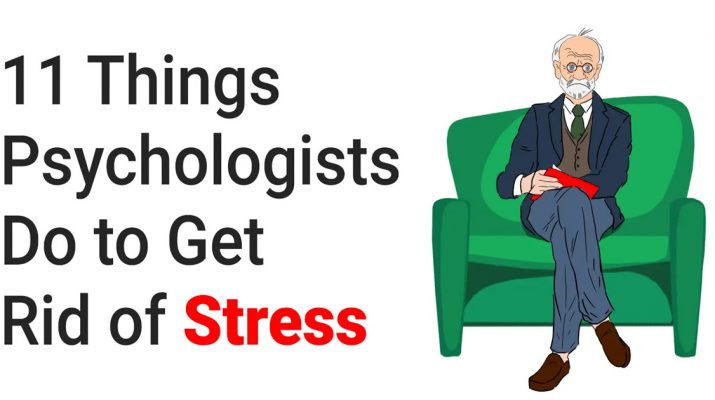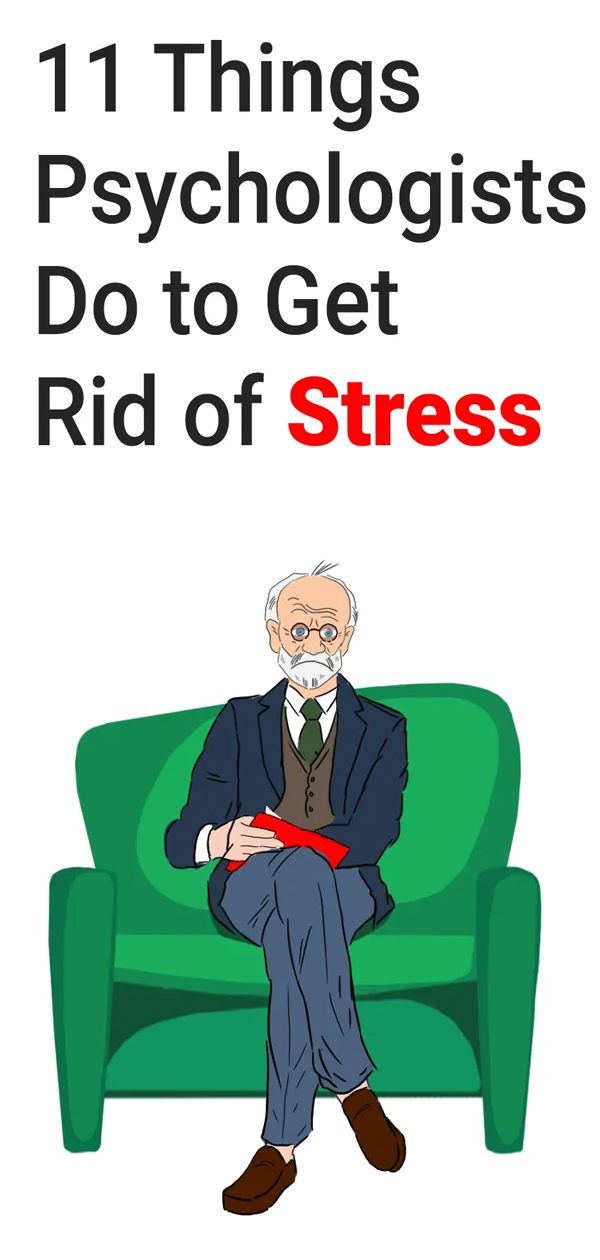For just about everyone, stress is an integral, yet undesirable, part of life. And while some of us seem to be able to take stressful situations in stride, others sometimes need some additional help. And since there’s no shortage of advice about dealing with stress, it can often be hard to know who to listen to.
Below, we’ve compiled 11 psychologist-recommended ways to reduce or eliminate stresses in your life–whether those stresses are caused by internal or external forces.
1.Progressive Muscle Relaxation
The mind and the body are incredibly connected, and this becomes very apparent when you’re dealing with stress. If you’ve ever noticed yourself clenching your teeth, carrying tension in your shoulders, or experiencing a new backache when stressed, then you too have felt the mind-body connection that stress tends to bring.
The good news is that, although mental stress can cause physical tension, deliberate physical relaxation can also lessen mental stress. Progressive muscle relaxation, a technique used by psychologist Kevin Chapman, involves deliberately tensing a group of muscles for 10 seconds, then relaxing them for 20 seconds before moving on. In order to optimally engage your muscles and breathing together, inhale while tensing and exhale while relaxing. This offers another stress-reducing benefit–the power of deep breathing.
Some experts recommend using an audio recording in which a narrator offers instructions on which muscle group to tense first. These recordings can help you ingrain the pattern of tension and relaxation. Once you have committed the exercises to memory, you may no longer need audio guidance.
2. Healthy Distractions
Foe many of us, when we’re under pressure, our main focus becomes trying to resolve the source of our stresses. And while a problem-solving mindset can be an asset, too much uninterrupted focus on the stressor can actually backfire, according to Dr. Kandi Wiens in the Harvard Business Review. People who constantly focus on their stressors tend to find it harder to get rid of stress and less able to focus, locking themselves into a challenging cycle.
Because simply telling yourself to take a break mentally can be tough, therapist Amy Przeworski suggests giving yourself some time each day to do something that makes you happy. Maybe that’s painting, or songwriting, or running. The point is to do something you enjoy. This gives your brain a respite, which can restore your emotional energy and help bring back your focus. Both of these things together will help you manage stress.
3. Regular Exercise And Time Outdoors
Exercise has long been lauded as a powerful stress relief. And that’s for good reason–according to Dr. Axe, physical exercise releases endorphins, which are extremely effective when it comes to reducing anxiety. If the stresses in your life are due to factors beyond your control, exercise can help you manage stress.
And if what’s bothering you is due to a problem you need to solve, the reduced anxiety and improved mental clarity exercise brings will more than likely bring you the focus you need to resolve the issue. You don’t have to be athletically-inclined, either–even going for a walk or a leisurely bike ride has benefits, too.
While exercise has its own benefits, several studies have shown that spending time in nature–whether that time is spent exercising or not–has demonstrable effects when it comes to stress relief. A Japanese study found that students who spent two nights in a forest had significantly reduced stresses upon their return compared to students who spent time in a city. In Japan, these short nature trips are known as “forest-bathing,” and they serve as a kind of reset for the brain.
Even if you don’t have time to spend a few nights camping in the forest, getting out in any kind of green space has positive effects on mood. Multiple studies have found that being outside in nature–whether that means going backpacking in the wilderness or going for a walk in a city park–can elevate mood significantly.
4. Meditation
Dr. Axe also explains the benefits of meditation, or healing prayer for the religious. These activities help those trying to get rid of stress because they provide a focal point beyond the self. We all know how easy it is to get into a spiral of anxiety, and both of these activities help you to both refocus and calm down.
If you haven’t meditated before, an easy way to start is to focus on your breathing. This type of centering focus, coupled with deep, slow breaths, often helps to slow your heart rate and assuage anxiety. For the technologically-inclined, there are a variety of meditation apps available for free online.
5. Consciously Slow The Flow Of Thoughts
It’s a common frustration to feel as though you have no control over your thoughts. In particular, those who seek out methods of stress relief may be searching for ways to help themselves embrace more positive thinking. One tip, recommended by psychologist Martin Seligman, involves loudly helping yourself switch your thoughts. Dr. Seligman recommends clapping your hands and yelling that you’ll think about your particular stressor later.
If you’re in public, or just prefer not yelling loudly, you can adapt this approach to suit your own style. You may want to try snapping a rubber band against your wrist, deliberately turning your focus to something outside yourself, or even doing a few pushups. The point here is to briefly shock yourself out of your thought pattern.
This isn’t to say you should always turn your thoughts away from negative things. But if worries about your job are starting to encroach on your family time, chances are good that a method like this will increase stress relief by helping you curb stress-inducing thought patterns.
6. Do Something Useful
This suggestion, which is popular with many 12-step programs, is based on the premise that stopping yourself from being idle (and making yourself do something practical) is helpful when it comes to getting out of your head. Being useful can mean a variety of different things–maybe you want to volunteer in your community or bring a snack to a friend who’s sick. But being useful if often as simple as cleaning up your kitchen or finishing that DIY project you’ve been meaning to get to.
7. Watch What You Eat
It’s easy to give into cravings for junk food when you’re stressed out. But making an effort to eat a balanced diet with plenty of whole foods will most likely help you in your quest for stress relief. By eating enough protein, healthy fats, and complex carbohydrates, you will be optimally fueled to conquer challenges at work and in your personal life.
8. Watch What You Drink
When you’re excessively stressed out, it seems understandable to guzzle coffee to energize yourself in the morning and to drink a beer or some scotch to relax after a long day. Both of these things are fine in moderation, but too much alcohol and caffeine can also worsen stresses. Both can make you dehydrated, and they also can cause sleep difficulties, according to Dr. Axe.
9. Try Stimulating Your Parasympathetic Nervous System
Part of why you may be tempted to eat when stressed is because stimulating the nerves in your lips helps to activate your parasympathetic nervous system, which helps to calm you down. Particularly if cravings for junk food (or alcohol or cigarettes) tend to come to you in times of mental struggle, give this method a shot.
10. Tap Into The Secrets Of Eastern Medicine
Business psychologist Sharon Melnick suggests a few methods used in Eastern medicine when it comes to managing and reducing anxiety. Particularly in times where you are so stressed you can feel a flutter in your heart, taking your thumb and pressing it into the indentation between your second and third knuckles can help. This is because it activates a nerve that works to reduce the tight feeling we often get when we’re under pressure or extremely anxious.
11. Keep A Journal
Sometimes, just being aware of your daily stresses and how you respond to them helps you to adjust your reactions and cope more effectively. Plus, writing out what’s bothering you is often useful when it comes to processing. Journal entries don’t have to be long and complex, or even well-written. Just taking 10 minutes a day to write about your challenges is a step in the right direction.
Taken altogether, the stresses of even everyday life tend to feel overwhelming sometimes. But when you have physician-recommended management techniques at your disposal, you’re much more likely to be able to feel better and improve your quality of life and your productivity as well.


